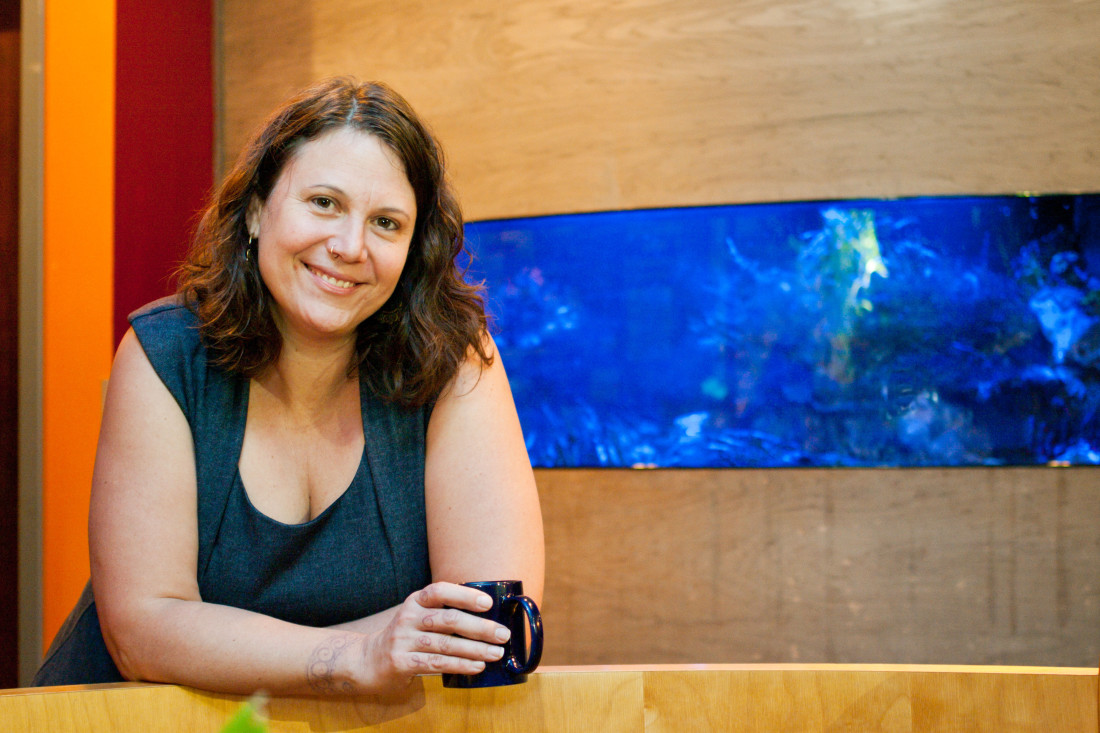News that landmark Asheville vegetarian restaurant Rosetta’s Kitchen was for sale rippled across local news outlets and social media after an ad appeared on craigslist the weekend after Thanksgiving. Within 48 hours, messages of consolation, shock, concern, encouragement and even some suggestions began to show up on owner and founder Rosetta Buan‘s personal Facebook page and email.
Buan says she isn’t surprised by this reaction; in fact, she welcomes it. “It’s time for a shift,” she says. Indeed, Buan herself is still trying to find the right words to explain the need for a new direction for her multifaceted food enterprise.
Opened in 2002 as a community-minded vegetarian restaurant, Rosetta’s Kitchen quickly established itself as a fundamental element of the unique culture of Lexington Avenue. Several of its menu items soon became local favorites, leading Rosetta’s to expand its brand in 2012 to offer frozen veggie burgers and peanut butter tofu at grocery stores regionally as well as wholesale to other restaurants.
Then, in May 2012, Compass Foods offered Rosetta’s a third-party space on the campus of UNC Asheville, and Rosetta’s Kitchenette launched there that August. Rosetta’s at UNCA is a cantina-style eatery, featuring cold and hot bars with vegetarian and vegan options for students on campus. “It’s been a great partnership with UNCA and Compass Foods,” says Buan. “I can’t even tell you how friendly they’ve been. They needed the authenticity that we brought to the project and were willing to bring us in, which says to me ‘I’m on the right track.'”
Soon, another opportunity presented itself in the form of the Lexington Avenue space that became Rosetta’s Buchi Bar. Some may have guessed that the financial strain of opening the kombucha-focused bar in June 2014 is what prompted Buan to put the business up for sale, but she refutes those rumors.
She recalls that she was offered the Buchi Bar space “a little prematurely” after the building’s owner at the time, J.C. Maynard, died, leaving the location vacant for the first time in 47 years. The historic space required a complete gutting and renovation before it opened as the Buchi Bar, but she made it work.
“It has been a huge risk and, quite honestly, a real challenge to grow that money part that fast,” she says. “But we did it, we’ve done it and we have a secure long-term favorable lease, so for those who have speculated that’s why we are for sale, no, that’s not the case.”
Buan’s business strategies have always been avant-garde. “Growth is good for a business like ours. You can create a larger impact, more purchases, better food for more people. I always really believed that my idea should continue to grow and spread. Because I hope that what I’m doing is being one part of a wave of people trying to make better business and better models — reinventing the rules of how business is done,” Buan says.
Although the growth has been good, and the business continues to be successful, Buan says she’s ready for something new.With responsibilities as a wife, mother of four, daughter to aging parents and business owner accountable for 36 employees, Buan, 39, says she often finds it challenging to maintain a healthy work-life balance. “In our search for growth, I’ve managed to grow a beast bigger than one mama bear can manage,” she says. “I don’t have as much drive to spend as many personal hours and personal relationships on this business as I have in the past. And those things have flipped as we’ve grown. We need the systems and the structure that can manage and support what we’ve created here.
“What we’ve created here is beautiful, and it is cool and it is great food and culture,” she continues. “And now that it’s gotten this big, it’s started to wiggle out of its shape. … We are not in crisis but we’re just not meeting our potential right now.”
Buan admits that the business has experienced “a really painfully tight year” but adds that the search for a partner is more about a desire to tighten up operations and tweak things in preparation for anticipated higher volume in the coming years. “When we were slammed and doing $5,000 days this summer, our operations were pushed beyond their max,” she says. “We’ve always just done things hands-on. After last summer, we realized we need more than that.”
Buan says she’s open to ideas as to how this transformation could occur, including the possibility of forming a cooperative. Several people have already contacted her with the idea of creating one. “But that’s going to take those people to show up, to take action; I cannot do it for them,” she says.
“We’ve honestly grown this as much as we can on our own. So this is our reach-out: We need help. And whether it’s bought into by the community or by a partner, we’re not desperate to sell to just anyone with cash, but we’re ready for a change,” Buan says. “That’s why we put the ad out on craigslist instead of using a broker. We’ve always done things simply and out in the open, so this seemed like the right way for us to engage the public and see what happens.”




Sounds like somebody needs a sugar daddy to prop up a failed business plan.
Sounds like somebody could do with being a little more magnanimous.